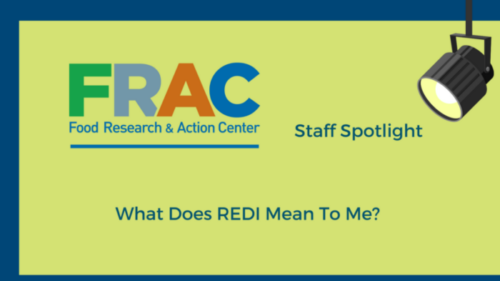May 2, 2022
FRAC works to improve the nutrition, health, and well-being of people struggling against poverty-related hunger in the U.S. through advocacy, partnerships, and by advancing bold and equitable policy solutions. This includes centering work around understanding and addressing issues around equity.
As the organization celebrates its 50th anniversary and looks forward to stepping boldly into the future, Racial, Equity, Diversity, and Inclusion (REDI) is central to FRAC’s mission, which looks at building a country in which all people have the nutritious food they need to lead healthy and productive lives, through equitable and effective policies.
For Celebrate Diversity Month in April, FRAC staff shared “What REDI means to me.” Below are ten testimonials.

| “REDI means to challenge ourselves: to be mindful of our biases and to think about what we are doing as we move things forward towards greater equity, diversity and inclusion.”– Luis Guardia, FRAC president |
| “To me, REDI means ensuring everyone has not only the same starting position but the same opportunities and the same sense of safety and comfort as their peers in the workplace and beyond each and every day.” – Kelsey Boone, child nutrition policy analyst |
| “Making our work place the most productive, inclusive and impactful place it can be.” – Alexis Bylander, senior child nutrition policy analyst |
| “For me, REDI is the continual and purposeful process of working to help ensure traditionally marginalized individuals and groups have equitable access and opportunity for health, well-being, and power. Actively practicing REDI means I take the time to continually listen, learn, and grow, and translating this growth into action in pursuit of eliminating systems of oppression and disparities generated by those systems.” – Katie Jacobs, Early Childhood Nutrition Programs and Food Systems associate |
| “REDI is an opportunity to create change while addressing systemic challenges related to race, ethnicity, identity, class, etc. Through REDI we have the chance to develop an inclusive system for the betterment of individuals and the organizations they are connected to.” – LaMonika Jones, Anti-Hunger Program analyst, Child Nutrition, D.C. Hunger Solutions |
| “What REDI means to me: ongoing and intentional efforts to ensure that people from historically and currently marginalized communities have access, respect, opportunity, and power in the spaces they live, work, and play. What that means for me: taking the space to reflect on my biases, actions, and privilege with humility; to learn and grow; and to take an active role in fighting for a more just society in my personal, professional, and community life.” – Allison Lacko, senior nutrition policy and research analyst |
| “To me REDI means learning, listening, supporting, and respecting ourselves and each other, and strengthening and applying our REDI work and values to all we do.” – Denise Odell, executive assistant to the president |
| “To me, REDI is an ongoing commitment to centering marginalized people and communities in our anti-hunger work. It is recognizing the ways we may have fallen short of the mark in the past, and actively working to course-correct and improve our work moving forward.” – Allyson Pérez, child nutrition policy analyst |
| “REDI means engaging in a learning space that allows everyone to feel understood and included in meaningful conversations regarding equity. It means developing a workplace culture that allows us to enhance our mission and support our stakeholders as we work to eradicate hunger in America.” – Rebecca Shaw, digital media coordinator |
| “To me, REDI means that FRAC is actively striving to practice what it preaches with integrity, especially as visibility, outreach, branding, impact—and scrutiny—increase exponentially; also, that FRAC recognizes how a strong commitment to REDI will inevitably serve to maximize the pool of exemplary talent available, enabling it to implement FRAC policies and projects most effectively. Finally, FRAC’s REDI initiatives serve to promote parity regarding access, opportunity, input, leadership, and empathy, internally as well as externally … even as we acknowledge and celebrate both our differences and shared values.” – Alan Sharpe, senior technology coordinator |


